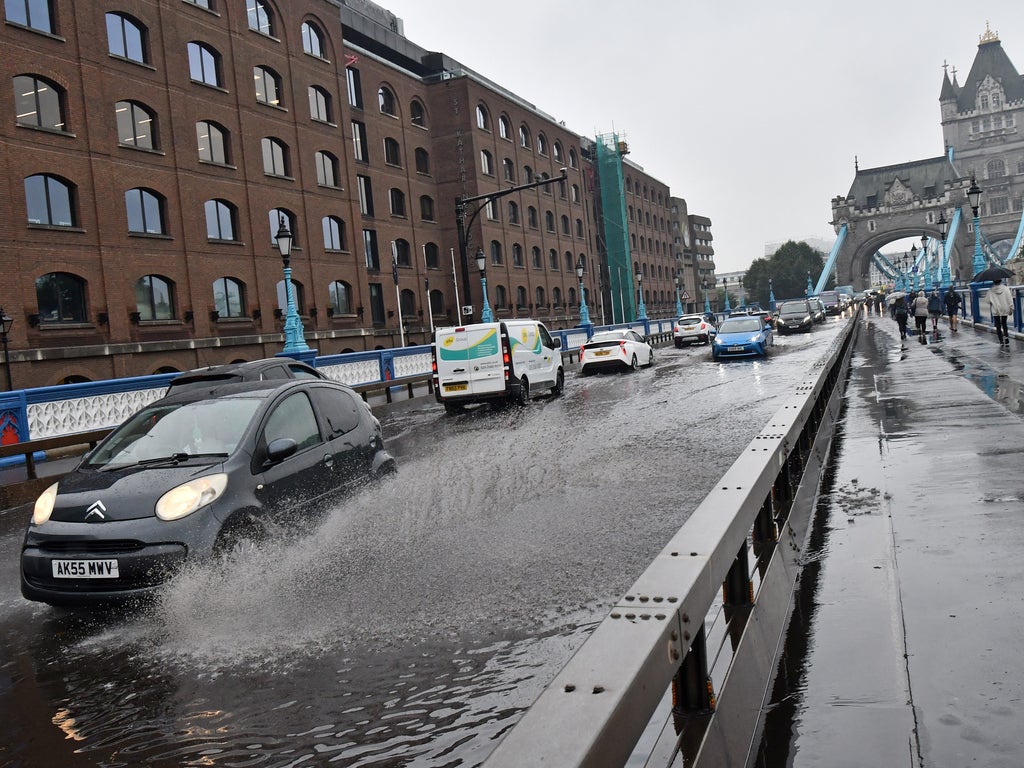
There is a risk people in basement flats could drown in flash floods across the UK, experts have said, amid warnings these weather events will become more frequent due to the climate crisis.
It comes as three storms battered the UK in a matter of days, with hundreds evacuated from homes near swelling river banks on Monday.
A climate policy expert said there was a “real risk” a flash flood could cause people to drown in London after a taskforce warned more needed to be done to prepare for future flooding in the capital.
Alastair Chisholm from the Chartered Institution of Water and Environmental Management told The Independent this was also the case across the whole of the UK.
“This risk is not isolated to London,” he said. “The risks identified relate to the extent of below-ground dwellings in London and the risk of flash flooding occurring at night when residents are asleep.”
The group’s director of policy added: “There are similar dwellings in countless other towns and cities across the UK.”
The risk of flooding comes from water running off from the surface into properties, as well as coming up from overwhelmed sewage systems.
Mr Chisholm said it was important for people in basement flats to understand the risk they face from flooding, which is set to happen more often as temperatures rise, so they can take appropriate action and prepare.
Last year, England’s Environment Agency warned the climate crisis – which leads to heavier rainfall and rising sea levels – was worsening the risk of floods across the UK.
Government advisors said last month even a small shift in the average climate can lead to “major changes in extreme events”, including increasing the frequency of severe flooding.
In London, the greatest flood risk comes from drainage systems being overwhelmed, authorities were told earlier this month. This surface water flooding can occur from intense rainfall or blockages in the system, a taskforce told London Councils.
It put forward recommendations to London Councils, which represents local authorities in the capital, to help the city plan for future flooding events, saying these were expected to become more frequent and potentially more intense when they occur due to the climate crisis.
Bob Ward, the deputy chair of the London Climate Change Partnership, said these weather events could pose a threat to life.
“There is a real risk of people drowning in basement flats if a major flash flood occurred in the middle of the night,” Mr Ward, who is also policy and communications director at the Grantham Research Institute on Climate Change and the Environment, told The Observer.
“The problem is particularly worrying because we have no idea how many people live in basement properties in London.”
The taskforce recommended areas or properties at high-risk of basement flooding to be identified in the capital, and for this information to be used to improve flood resilience.
It also said there needed to be a plan to manage the increasing risk of surface water flooding in London, whose Victorian drainage system was “not designed to cope” with the number of people in the capital and where it was unclear whether residents understood if they were vulnerable to flooding.
Mayor Philip Glanville, the Chair of London Councils’ transport and environment committee, said boroughs were working to improve understanding on how to prevent serious surface water flooding events. “However, currently there is not one single organisation responsible for dealing with surface water flooding which makes solving problems more complex,” he said.
More than 100 flood alerts were issued across the UK on Monday, including in Yorkshire, the West Midlands and London, as Storm Franklin swept through the country. It comes after Storm Dudley and Storm Eunice caused havoc in the days before.







